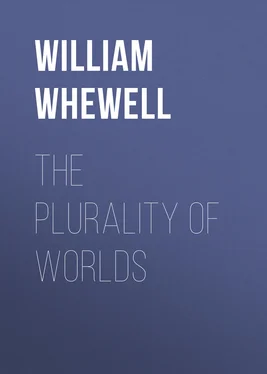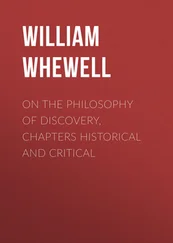William Whewell - The Plurality of Worlds
Здесь есть возможность читать онлайн «William Whewell - The Plurality of Worlds» — ознакомительный отрывок электронной книги совершенно бесплатно, а после прочтения отрывка купить полную версию. В некоторых случаях можно слушать аудио, скачать через торрент в формате fb2 и присутствует краткое содержание. Жанр: foreign_antique, Физика, foreign_edu, на английском языке. Описание произведения, (предисловие) а так же отзывы посетителей доступны на портале библиотеки ЛибКат.
- Название:The Plurality of Worlds
- Автор:
- Жанр:
- Год:неизвестен
- ISBN:нет данных
- Рейтинг книги:4 / 5. Голосов: 1
-
Избранное:Добавить в избранное
- Отзывы:
-
Ваша оценка:
- 80
- 1
- 2
- 3
- 4
- 5
The Plurality of Worlds: краткое содержание, описание и аннотация
Предлагаем к чтению аннотацию, описание, краткое содержание или предисловие (зависит от того, что написал сам автор книги «The Plurality of Worlds»). Если вы не нашли необходимую информацию о книге — напишите в комментариях, мы постараемся отыскать её.
The Plurality of Worlds — читать онлайн ознакомительный отрывок
Ниже представлен текст книги, разбитый по страницам. Система сохранения места последней прочитанной страницы, позволяет с удобством читать онлайн бесплатно книгу «The Plurality of Worlds», без необходимости каждый раз заново искать на чём Вы остановились. Поставьте закладку, и сможете в любой момент перейти на страницу, на которой закончили чтение.
Интервал:
Закладка:
4. Such is, in a general way, the objection to Religion with which Chalmers deals; and, as I have said, his mode of treating it is highly interesting and instructive. Perhaps, however, we shall make our reasonings and speculations apply to a wider class of readers, if we consider the view now spoken of, not as an objection, urged by an opponent of religion, but rather as a difficulty, felt by a friend of religion. It is, I conceive, certain that many of those who are not at all disposed to argue against religion, but who, on the contrary, feel that their whole internal comfort and repose are bound up indissolubly with their religious convictions, are still troubled and dismayed at the doctrines of the vastness of the universe, and the multitude of worlds, which they suppose to be taught and proved by astronomy. They have a profound reverence for the Idea of God; they are glad to acknowledge their constant and universal dependence upon His preserving power and goodness; they are ready and desirous to recognize the working of His providence; they receive the moral law, as His law, with reverence and submission; they regard their transgressions of this law as sins against Him; and are eager to find the mode of reconciliation to Him, when thus estranged from him; they willingly think of God, as near to them. But while they listen to the evidence which science, as we have said, sets before them, of the long array of groups, and hosts, and myriads, of worlds, which are brought to our knowledge, they find themselves perturbed and distressed. They would willingly think of God as near to them; but during the progress of this enumeration, He appears, at every step, to be removed further and further from them. To discover that the Earth is so large, the number of its inhabitants so great, its form so different from what man at first imagines it, may perhaps have startled them; but in this view, there is nothing which a pious mind does not easily surmount. But if Venus and Mars also have their inhabitants; if Saturn and Jupiter, globes so much larger than the earth, have a proportional amount of population; may not man be neglected or overlooked? Is he worthy to be regarded by the Creator of all? May not, must not, the most pious mind recur to the exclamation of the Psalmist: "Lord, what is man, that thou art mindful of him?" And must not this exclamation, under the new aspect of things, be accompanied by an enfeebled and less confident belief that God is mindful of him? And then, this array of planets, which derive their light from the Sun, extends much further than even the astronomer at first suspected. The orbit of Saturn is ten times as wide as the orbit of the earth; but beyond Saturn, and almost twice as far from the sun, Herschel discovers Uranus, another great planet; and again, beyond Uranus, and again at nearly twice his distance, the subtle sagacity of the astronomers of our day, surmises, and then detects, another great planet. In such a system as this, the earth shrinks into insignificance. Can its concerns engage the attention of him who made the whole? But again, this whole Solar System itself, with all its orbits and planets, shrinks into a mere point, when compared with the nearest fixed star. And again, the distance which lies between us and such stars, shrinks into incalculable smallness, when we journey in thought to other fixed stars. And again, and again, the field of our previous contemplation suffers an immeasurable contraction, as we pass on to other points of view.
5. And in all these successive moves, we are still within the dominions of the same Creator and Governor; and at every move, we are brought, we may suppose, to new bodies of his subjects, bearing, in the expansion of their number, some proportion to the expanse of space which they occupy. And if this be so, how shall the earth, and men, its inhabitants, thus repeatedly annihilated, as it were, by the growing magnitude of the known Universe, continue to be anything in the regard of Him who embraces all? Least of all, how shall men continue to receive that special, persevering, providential, judicial, personal care, which religion implies; and without the belief of which, any man who has religious thoughts, must be disturbed and unhappy, desolate and forsaken?
6. Such are, I conceive, the thoughts of many persons, under the influence of the astronomical views which Chalmers refers to as being sometimes employed against religious belief. Of course, it is natural that the views which are used by unbelievers as arguments against religious belief, should create difficulties and troubles in the minds of believers; at least, till the argument is rebutted. And of course also, the answers to the arguments, considered as infidel arguments, would operate to remove the difficulties which believers entertain on such grounds. Chalmers' reasonings against such arguments, therefore, will, so for as they are valid, avail to relieve the mental trouble of believers, who are perplexed and oppressed by the astronomical views of which I have spoken; as well as to confute and convince those who reject religion, on such astronomical grounds. It may, however, as I have said, be of use to deal with these difficulties rather as difficulties of religious men, than as objections of irreligious men; to examine rather how we can quiet the troubled and perplexed believer, than how we can triumph over the dogmatic and self-satisfied infidel. I, at least, should wish to have the former, rather than the latter of these tasks, regarded as that which I propose to myself.
I shall hereafter attempt to explain more fully the difficulties which the doctrine of the Plurality of Worlds appears to some persons to throw in the way of Revealed Religion; but before I do so, there is one part of Chalmers' answer, bearing especially upon Natural Religion, which it may be proper to attend to.
CHAPTER III
1. It is not my business, nor my intention, to criticize the remarkable work of Chalmers to which I have so often referred. But I may say, that the arguments there employed by him, so far as they go upon astronomical or philosophical grounds, are of great weight; and upon the whole, such as we may both assent to, as scientifically true, and accept as rationally persuasive. I think, however, that there are other arguments, also drawn from scientific discoveries, which bear, in a very important and striking manner, upon the opinions in question, and which Chalmers has not referred to; and I conceive that there are philosophical views of another kind, which, for those who desire and who will venture to regard the Universe and its Creator in the wider and deeper relations which appear to be open to human speculation, may be a source of satisfaction. When certain positive propositions, maintained as true while they are really highly doubtful, have given rise to difficulties in the minds of religious persons, other positive propositions, combating these, propounded and supported by argument, that they may be accepted according to their evidence, may, at any rate, have force enough to break down and dissipate such loosely founded difficulties. To present to the reader's mind such speculations as I have thus indicated, is the object of the following pages. They can, of course, pretend to no charm, except for persons who are willing to have their minds occupied with such difficulties and such speculations as I have referred to. Those who are willing to be so employed, may, perhaps, find in what I have to say something which may interest them. For, of the arguments which I have to expound, some, though they appear to me both very obvious and very forcible, have never, so far as I am aware, been put forth in that religious bearing which seems to belong to them; and others, though aspiring to point out in some degree the relation of the Universe and its Creator, are of a very simple kind; that is, for minds which are prepared to deal with such subjects at all.
Читать дальшеИнтервал:
Закладка:
Похожие книги на «The Plurality of Worlds»
Представляем Вашему вниманию похожие книги на «The Plurality of Worlds» списком для выбора. Мы отобрали схожую по названию и смыслу литературу в надежде предоставить читателям больше вариантов отыскать новые, интересные, ещё непрочитанные произведения.
Обсуждение, отзывы о книге «The Plurality of Worlds» и просто собственные мнения читателей. Оставьте ваши комментарии, напишите, что Вы думаете о произведении, его смысле или главных героях. Укажите что конкретно понравилось, а что нет, и почему Вы так считаете.











